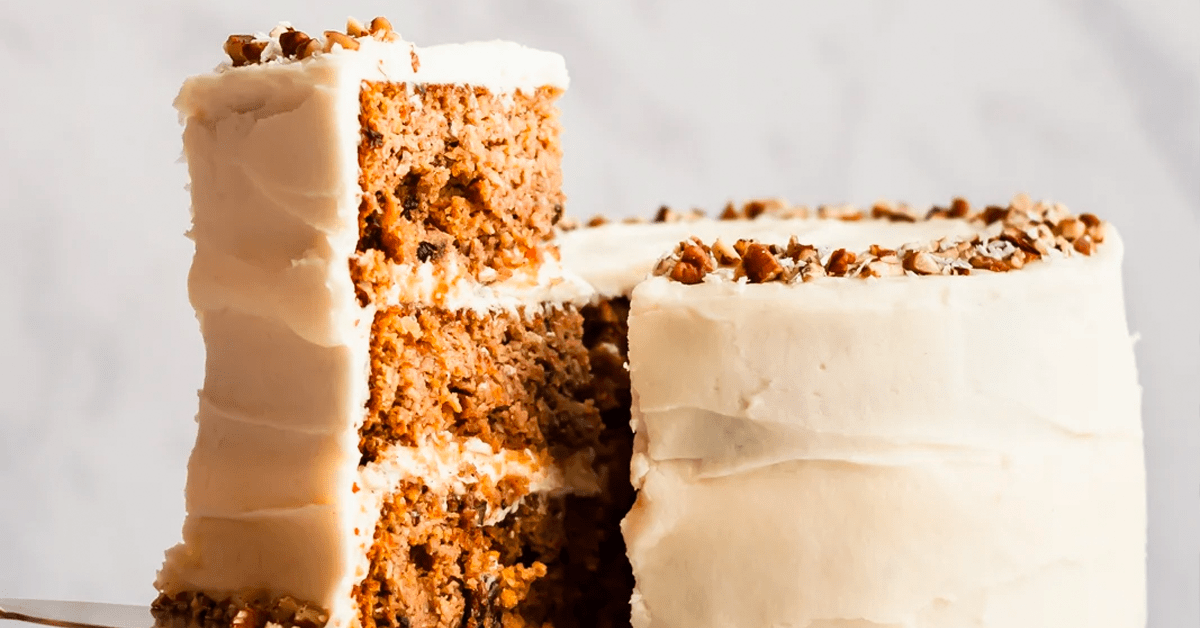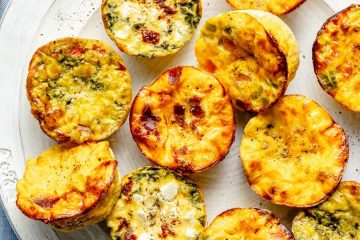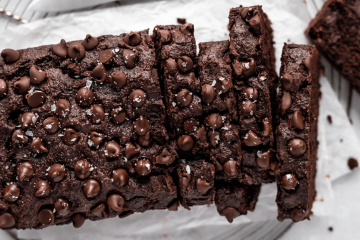Over the past few years, carrot cake has become my favorite cake on the planet. I love that it’s packed with spices, super moist, full of incredible flavor and plenty of texture thanks to carrots, coconut, raisins and nuts.
Where my carrot cake lovers at?! I have a full post of ALL of my carrot cake flavored recipes here.
As most of you know, I LOVE baking cake recipes for special occasions: paleo chocolate cake, tahini chocolate chip cake, my strawberry shortcake cake and my peanut butter banana cake are just a few of my favorites.
So I thought to myself, why not make a healthier, paleo-friendly and gluten free carrot cake that’s absolutely perfect for springtime and especially Easter? To make it healthier, I used natural unrefined sweeteners, grain free, nutrient-dense flours, and a few other special ingredients to keep it deliciously moist and true to the carrot cake flavor we all know and love.
This is truly the BEST healthy carrot cake you’ll ever eat!


What you’ll need to make this healthy gluten free carrot cake
This healthy carrot cake requires a few specialty ingredients, but trust me when I say that this will absolutely be the BEST healthy carrot cake you’ll EVER eat. Here’s what you need:
- Almond flour: I recommend using a fine blanched almond flour. Make sure you pack the almond flour like you would with brown sugar!
- Coconut flour: this is a great gluten free flour to help absorb moisture in recipes and also add fiber and nutrition. No need to pack the coconut flour though.
- Finely shredded unsweetened coconut: in my opinion, this cake requires shredded coconut for texture. I haven’t made it without the shredded coconut so please don’t skip it, it’s crucial for texture.
- Spices: no carrot cake is complete without the addition of cinnamon and a little nutmeg.
- Vanilla extract: just an essential.
- Eggs: this recipe uses four eggs to help with consistency and texture. I’ve added some notes below if you’re interested in making this vegan.
- Pure maple syrup: WOW is all I can say. The maple syrup is just a nice touch to this recipe and adds so much flavor and additional moisture.
- Tahini: while it’s only a small amount, the tahini is crucial to the recipe. I think you can add almond butter or cashew butter instead but tahini is INCREDIBLE and has a unique drippy texture, unlike other nut butters. Just trust me and make the cake as is!
- Coconut oil: If you don’t want to use coconut oil, you can always use melted butter.
- Almond milk: please know that any dairy free milk will work.
- Carrots: this recipe uses 3 cups of grated carrots! I like small or medium grate for my carrot cake recipes.
- Mix-ins: I love adding raisins and chopped pecans or chopped walnuts!
How to make paleo carrot cake
To make this carrot cake paleo and dairy free, simply use a dairy free cream cheese and a paleo friendly powdered sugar option. You can also use Simple Mills frosting.


Can I make this cake vegan?
I haven’t tried making this healthy carrot cake vegan, but if you want to try you can use 4 flax eggs (4 tablespoons flaxseed meal + 12 tablespoons water). Let me know in the comments how it works out!
Can I use all purpose flour?
Unfortunately, no, I would not recommend using all purpose flour or any alternative flours in this recipe as the texture and consistency of the carrot cake will change.


Tips for making this gluten free carrot cake
- Use medium grated carrots. You can grate the carrots in your food processor with the grate blade, or you can use a hand grater.
- Pack the almond flour. You’ll want to make sure you pack the almond flour just like you would with brown sugar. Do not pack the coconut flour.
- Use room temp ingredients: be sure to let the eggs come to room temperature before using them in the recipe, otherwise the coconut oil will coagulate the batter. The coconut oil should be melted but not HOT, but rather closer to room temperature.
- Make it ahead of time. You can make this cake 1-2 days ahead of time and it will still be absolutely delicious!


Tricks for beautiful frosting
Frosting a whole cake can seem daunting, but with these couple of tips you’ll have a beautifully frosted healthy carrot cake in no time:
- Cool before frosting. Make sure you follow the directions as written and wait until the cakes are completely cool before frosting them. After they are frosted, I recommend storing carrot cake in the fridge for optimal freshness.
- Do a crumb coat. Do a crumb coat for the frosting first by frosting the layers as you normally would and then coat the outside of the cake with a very thin layer of frosting then place in the fridge for 10-15 minutes before you finish frosting. This is so that the crumbs stick to this layer of frosting and not your main layer.
How to store & freeze this healthy carrot cake
One of the best parts about this healthy carrot cake recipe is that you can make it 1-2 days ahead of time. I like to make the cakes ahead of time and keep them in the fridge for easy assembly, but you can also store it after you’ve frosted the cake, too!
- To store: I recommend storing the cake covered in the refrigerator for up to 5 days.
- To freeze: feel free to freeze this carrot cake either frosted or unfrosted for up to 2 months. I recommend freezing it unfrosted in individual layers for the best results. First, wrap each individual layer in plastic wrap, then aluminum foil and then place the cakes in a zip-top freezer bag. When you’re ready to serve it, simply thaw it in the refrigerator overnight and then let the cake come to room temperature before serving.


Recommended tools
Get all of my kitchen essentials here!
More cake recipes you’ll love
Get all of our amazing cake recipes here!
I know you’re going to love this healthy gluten free carrot cake, please let me know if you make it by leaving a comment and rating the recipe below. I’d love to hear from you and it helps encourage others to make the recipe too! xo.
P.S. feel free to listen to my cinnamon carrot cake playlist on spotify while you bake this!


The
Ambitious Kitchen
Cookbook
125 Ridiculously Good For You, Sometimes Indulgent, and Absolutely Never Boring Recipes for Every Meal of the Day
The Best Healthy Carrot Cake You’ll Ever Eat (gluten free & paleo-friendly!)


The BEST moist healthy carrot cake you’ll ever eat made with almond and coconut flour and naturally sweetened with pure maple syrup. Packed with coconut, raisins and pecans and topped with a delicious cream cheese frosting that’s easily dairy free! This paleo-friendly gluten free carrot cake will be your new favorite carrot cake recipe.
Ingredients
- Dry Ingredients:
- 2 cups (224g) packed super fine blanched almond flour (I use Bob’s Red Mill)
- ½ cup (56g) coconut flour (do not pack)
- ½ cup (43g) unsweetened finely shredded coconut (I use Bob’s Red Mill)
- 1 teaspoon baking soda
- 1 tablespoon ground cinnamon
- ¼ teaspoon ground nutmeg
- ½ teaspoon salt
- Wet ingredients:
- 4 large eggs, at room temperature
- ¾ cup (234g) pure maple syrup
- ⅓ cup (77g) drippy tahini (or sub almond butter but tahini has better flavor for this cake!)
- ¼ cup (60g) unsweetened almond milk
- 1 teaspoon vanilla extract
- ⅓ cup (75g) melted and cooled coconut oil
- 3 cups (300g) shredded carrots (medium grate)
- Optional mix-ins:
- ½ cup (80g) raisins
- ½ cup (56g) chopped pecans or walnuts
- For the frosting:
- ½ cup (113g) salted butter, at room temperature (or sub vegan buttery stick)
- 8 ounces (224g) cream cheese, at room temperature (or sub dairy free cream cheese)
- 3 cups (339g) powdered sugar
- 2 teaspoons pure vanilla extract
- 1 tablespoon (15g) unsweetened almond milk (any milk will work)
- For the topping:
- Extra pecans and shredded coconut
Instructions
-
Preheat oven to 350 degrees F. Line the bottom of three 6-inch round cake pans or two 8-inch round cake pans with parchment paper rounds. Spray parchment paper and sides of pan with nonstick cooking spray. YOU SHOULD USE PARCHMENT PAPER or the cake is likely to stick. Please do not forget.
-
In a large bowl, whisk the almond flour, coconut flour, unsweetened shredded coconut, baking soda, cinnamon, nutmeg and salt together. Set aside.
-
In a large bowl, whisk together the eggs, pure maple syrup, tahini, almond milk, vanilla extract until smooth.
-
Slowly whisk in the melted and cooled coconut oil until it’s well incorporated, then stir in the carrots. Note: It is important that your eggs are at room temperature otherwise the coconut oil with coagulate. The coconut oil should be melted but not HOT, but rather closer to room temp.
-
Add dry ingredients to wet ingredients and mix with a wooden spoon until well combined. Stir in raisins and nuts, if using.
-
Divide batter evenly between pans and spread out with a spatula to smooth the tops. Bake for 22-32 minutes in the two 8-inch pans and 30-40 minutes for three 6-inch pans.
-
Cakes are done when a tester comes out clean or with just a few crumbs attached. Allow cake to cool completely before frosting or removing from the pans. The cake should be room temperature when you frost it. This is very important. Cakes can be made a day ahead if you’d like.
-
Make your frosting: In the bowl of an electric mixer, add the softened butter and cream cheese and whip on high until light and fluffy. Add powdered sugar, vanilla extract and milk and beat for 2-3 minutes more.
-
Now it’s time to frost the cake: place about 1 tablespoon down onto onto the cake stand and spread out. Invert cake onto the cake stand, add about ½ heaping cup frosting between each layer, repeat with each cake, then frost the top and sides of the cake with the remaining frosting.
-
Decorate cake with pecans and shredded coconut on top. Once you are done frosting, place the cake to the fridge. Cake will stay good for 5-7 days in the fridge, and should be covered to ensure freshness. Serves 16.
Recipe Notes
To make vegan: I haven’t tried making this cake vegan, but if you want to try you can use 4 flax eggs (4 tablespoons flaxseed meal + 12 tablespoons water).
How to store carrot cake: I recommend storing the cake covered in the refrigerator for up to 5 days. See the full post for freezing instructions!
Recipe by: Monique Volz // Ambitious Kitchen | Photography by: Eat Love Eats
This recipe was originally published on April 1, 2019, republished on April 6, 2020, updated & republished on March 26, 2021, republished on March 22nd, 2023, and republished on March 14th, 2024.





